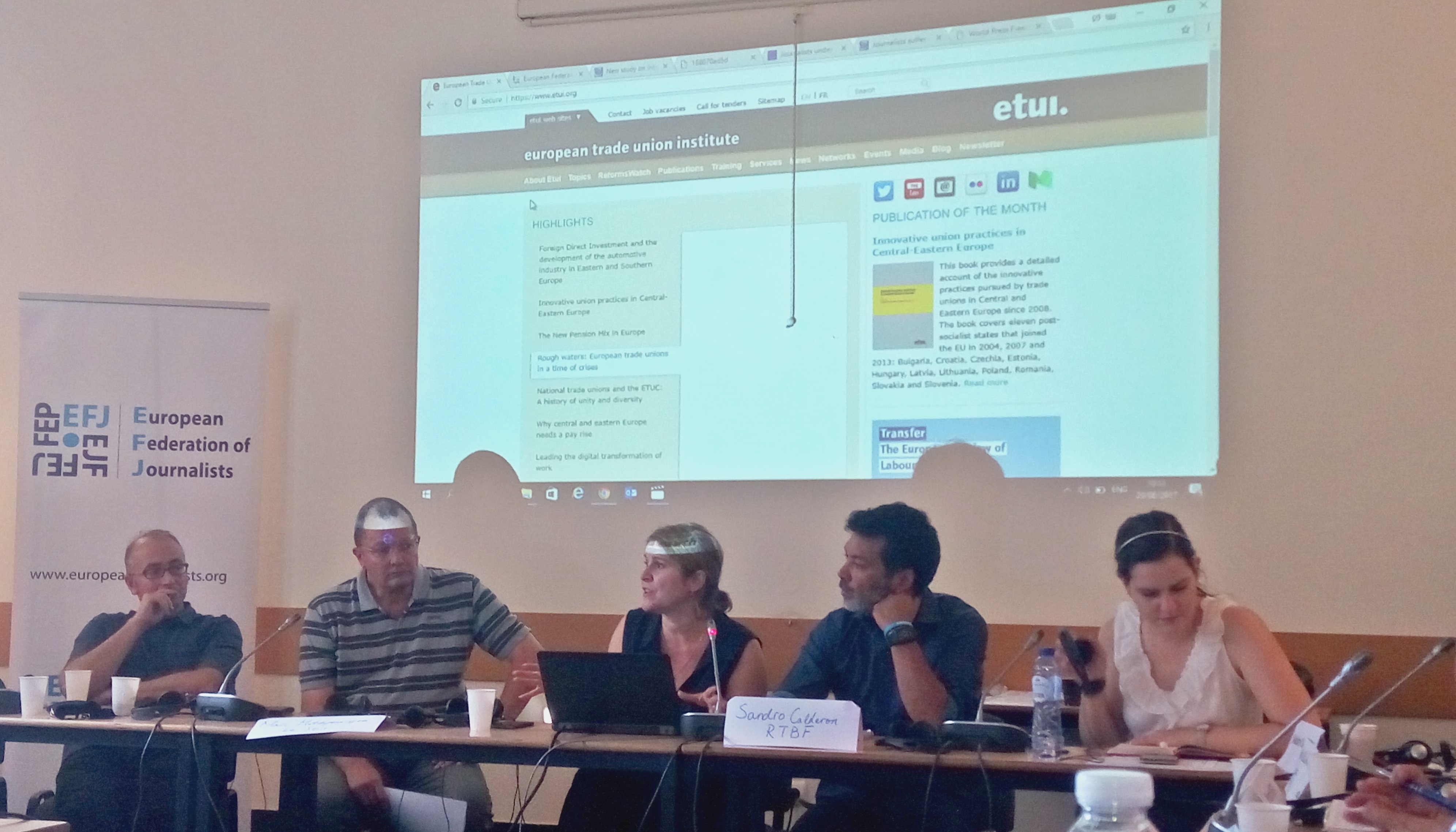
BRUSSELS, 04.09.2017. – Journalists are facing increasing economic and political pressure hampering editorial independence in the newsrooms, concluded 20 journalists who attended the two-day workshop on Promoting editorial independence in the newsrooms. It was co-organised by the European Federation of Journalists (EFJ) together with the European Trade Union Institute (ETUI) on 29 & 30 August with the financial support of the European Union. The workshop was also supported by the Association des journalistes Professionnels (AJP, Belgium) alongside their yearly Summer School for young journalists in Belgium.
Journalists coming from 13 European countries (including Austria, Belgium, Croatia, Estonia, France, Finland, Macedonia, Montenegro, Lithuania, Russia, Serbia, Spain and Ireland) expressed their daily challenges to maintain editorial independence in the newsroom and exchanged ideas on developing measures to remain independent.
“We want for journalists to be a part of the newsroom management,” said Sandro Calderon, journalist from RTBF, the public broadcaster of the French Community of Belgium. In that way, they have more influence on what is being decided in their media. He highlighted that apart from political sensitive issues, journalists also face the pressure of increasing workload which can compromise the quality and editorial independence. One of the ways to ensure editorial independence is by securing decent working conditions of journalists. “Journalists don’t have good contracts, so we negotiate for better conditions and try to mobilize them. By pressuring more we reduce the burn outs. In doing that we recently obtained 60 new permanent contracts from the management,” Calderon added.
President of the Société des Journalistes Professionnels at Le Soir (daily newspaper in Belgium), Marc Metdepenningen explained to the participants that the collective agreement at Le Soir contains provision to ensure editorial independence. Metdepenningen said “newspapers have two sort of capitals: the economic capital and the moral or intellectual capital. Any paper without moral values is not good for its readers. Editorial independence and quality information can gain trust among readers.”

When it comes to ensuring editorial independence in the newsrooms, trade unions and press councils play an important role in it. Jean-François Dumont, deputy general secretary at the AJP and Muriel Hanot, general secretary at the Belgian press council (CDJ ) both agreed on importance of lobbying national institutions and negotiating with media owners and managers to respect the rights of journalists. Collective action through journalists’ unions and association can be efficient ways to ensure editorial independence in the newsroom.
The participants outlined some of the pressing issues including state control of the media (especially in Russia), physical attacks on journalists and the interference on editorial decision from advertisers. Many journalists expressed that it is common to impose self-censorship when writing about stories related to advertisers.
Even in Finland, journalists face mounting political pressure as illustrated by Susanna Sjösted, a journalist from the Finnish Public Service Broadcaster YLE. She shared a recent case of editorial interference from the country’s prime minister. The scandal called YLEgate has led to journalists resigned and loss of public trust in YLE.
The common issue is also the need of journalists to fight for their stories, since frequently they don’t get published so that the media doesn’t lose the money from advertisers, who often think that journalists don’t have a problem with writing sponsored content.
The purpose of the workshop was also developing an action plan to be implemented at the workplace. The participants agreed that media workers need to take more decisive action and presented some possible solutions:
- pressure to media owners by collective actions, such as strikes;
- raising awareness of journalists to be part of trade unions;
- promoting the benefits of unions with campaigns, where social media can be a good tool for reaching more people;
- involving audience to demand reliable information;
- empowering journalists to use legal support, which is effective in a lot of cases, but not implemented enough;
- awards for those who promote media freedom the most;
- lawyers inside trade unions, who would have agreements with public prosecutors;
- education campaigns and seminars on editorial independence.